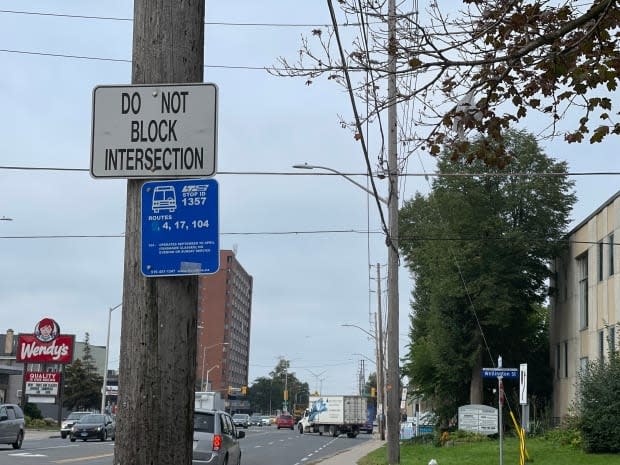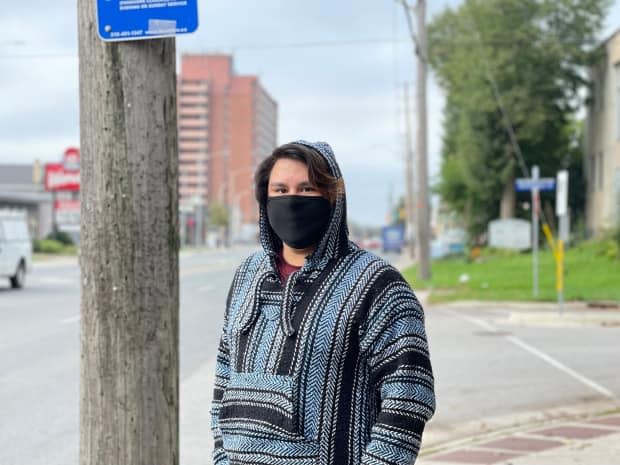Indigenous man asks London Transit for 'more sensitivity' after being denied service

An Indigenous man says he was racially profiled after a bus driver for the London Transit Commission (LTC) ordered he be barred from service for an entire day.
Ian Badger, 33, was planning to take the Route 4 bus to work on the morning of Oct. 3.
He waited at a bus stop in downtown London, Ont., in front of New St. James Presbyterian Church, at Wellington and Oxford Streets. He was wearing a mandatory face mask and the hood of his sweater was up to protect his head from the cold.
As the bus pulled up in front of him, Badger took out his ticket and prepared to board, as he had many times before. But he said he didn't expect what happened next.
"The doors don't open," Badger said. "And then it speeds off and takes the corner left turn really quickly, as if to make sure I can't even catch up. And then all these other buses just started speeding by at the same time. I was pretty shocked."
Badger took an Uber to get to work. At the end of his shift, he left a message with the LTC's customer service line, detailing the incident. He said he made a point to disclose that he identifies as Cree to the representative.

"When I told him my name, he's like, 'How do you spell your name?' And I said, 'Ian Badger,'" said Badger.
"And he's like, 'Badger, like the critter?' I'm like, 'We're Indigenous, we're named after animals sometimes. Sorry.'"
About a week later, the LTC contacted Badger to tell him the driver had mistaken him for one of 40 passengers banned from riding the bus. He learned from the representative that the driver had told his co-workers in the area to avoid picking him up for the rest of the day.
'Mistaken identity,' says transit service
According to Badger, the representative said the driver who sped by is in charge of banning decisions.
The representative also said that upon reviewing bus camera footage of the incident, Badger did not fit the physical description of anyone who had been banned, even with his hood up and mask on.
"I'm confused and angry and obviously embarrassed because there's no reason that should have happened," said Badger.
"I do feel like I was racially profiled. I was standing by an 'Every Child Matters' sign from the church, so the optics were not great."
The LTC sent Badger 10 bus tickets to make up for the money he spent on the Uber.

In an email to CBC News, a spokesperson said the LTC is aware of the incident and has investigated accordingly.
"We can confirm that the investigation findings indicated that this incident was a case of mistaken identity, with our operator mistaking this customer as a banned passenger. This information was shared with the customer at the conclusion of the investigation, as were our apologies for the mistake," wrote general manager Kelly Paleczny.
"If the customer feels that he was racially profiled, we would ask that he provide those details to London Transit so that a further investigation can be undertaken."
'Not a friendly city for people like me'
Badger said he has experienced racism in London before.
"It's not a friendly city for people like me," he said. "It happens a lot to me, and it's something that I have to deal with just as a regular person. I don't feel supported."
According to a recent report commissioned by London & Middlesex Local Immigration Partnership (LMLIP), Indigenous people in London and Middlesex County experience more discrimination than immigrants and visible minorities.
Six out of 10 Indigenous respondents said they've faced discrimination in the region over the last three years.
"Twenty-five per cent of Indigenous respondents specifically indicated they've experienced discrimination on public transit," said Dr. Vicki Esses, director of the Network for Economic and Social Trends at Western University and co-author of the report.
"We should be upset and angry about it, but I don't think it is a big surprise. We do know that Indigenous people experience a great deal of discrimination in many regions of the country."
Badger said he would like to see more sensitivity and representation of Indigenous people within the city's transit service. He also said he has not attempted to board an LTC bus since Oct. 3.
"They don't know what was going on with this bus driver that day, but he went out of his way to make sure that I didn't get on the bus and that I knew that I wasn't allowed on the bus," he said.
"They're in charge of an essential service in the city and I doubt I'm the only one who this has ever happened to."


